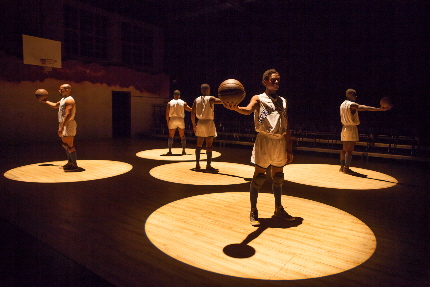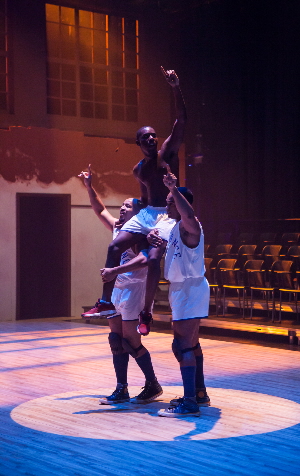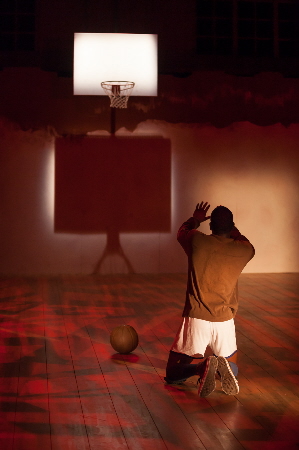
M Ensemble’s production of The Kings of Harlem / Photos by Deborah Gray Mitchell
By Bill Hirschman
Background music, sometimes tenderly introspective, sometimes upliftingly powerful, is deftly woven throughout the surging triumph of both the rise of the all-black 1939 New York Renaissance basketball team and M Ensemble’s moving recreation of the “Rens” banner year in Layon Gray’s Kings of Harlem.
The use of music echoes the exhortation of Rens coach Edwin “Pops” Coffey as he tells his team to calibrate their actions in tandem to an internal music. So when their basketballs pound the floor of the court, it’s a unified percussive rhythm that becomes more complicated as if they were jazzmen expressing their individual personalities within the context of a single song.
Similarly, dialogue is skillfully interstitched among the team members as they banter with words flying across the court like a dribble, pass, pass, pass and layup.
The Rens are little known today although they have been honored in the annals of the sport. But they were champions of segregated baseball leagues from the 1920s to the 1940s, winning more games than virtually any team black or white. Their home court was housed in the Renaissance Casino and Ballroom, but they also barnstormed through Southern communities defeating white teams.
Although hailed by African-Americans as their surrogate champions in multiple senses during the Harlem Renaissance and the Great Depression, they were twice refused admittance to the white National Basketball League. But in one historic post season tournament in 1939, they vanquished the champion white team, the Oshkosh All-Stars.
 The memory play of flashbacks is bookended by a slide presentation by Coffey’s great-grandson who reminds us repeatedly, “History has a right to live.”
The memory play of flashbacks is bookended by a slide presentation by Coffey’s great-grandson who reminds us repeatedly, “History has a right to live.”
Like The Royale at GableStage and other sports-inspired plays, the production melds highly theatrical elements such as sophisticated choreography, sound and lighting along with traditional direction and performance skills to create an effectively affecting evening.
Much of the credit is due Gray, who is the playwright, director and choreographer of this and several editions over the past two years. His experience staging the work results in a highly polished production. In other hands, both in script and execution, this material might seem a manipulative over-reverential movie of the week, many cuts below Hoosiers or The Help.
But Gray and the ensemble of actors here (and this show defines ensemble acting) infuse this with recognizable and credible emotions of anger, disappointment and conquering resolve. Gray and company give each character a backstory, distinct personality and in some cases, a motivating secret.
Above all, every moment is suffused with justified, hard-earned pride, that of the characters and of the thespians
The cast is fine, although occasionally words get mumbled. But there are standouts.
Allan Louis, a Miami native with extensive national credits, creates an inspiring coach whose locker room invocations are a rallying reminder to both the team and the audience of the importance of determination, courage, hard work and their responsibility to their community as a source of pride and inspiration. His coach is quietly compassionate while unwavering in demanding that standards be met and exceeded. When Louis intones in measured cadences the kind of motivational phrases found in self-help books, his delivery is so genuine, so perfectly finds the truth in the clichés, that it will arouse anyone who listens.
Marquise Rogers is a Barry University grad inhabiting Clem Johnson whose taciturn standoffishness hides a terrible secret rooted in Florida’s infamous Rosewood tragedy. When his pain finally bursts forth, the intensity of his anger is the emotional equivalent of a tank of gasoline exploding.
And finally, there’s longtime M Ensemble mainstay Andre L. Gainey as JoJo the oldest team member who has been with friends with Coffey for 18 years and is now in his 16th season with the team. We’ve said this before: Gainey’s performances as they have reached the stage have had varying degrees of success over the years. But, once again here, he proves that when he has a good director as he did with Joseph Adler in The Royale and here with Gray, Gainey proves how solid an actor he really is. Gainey makes JoJo far more than just the paternalistic elder statesman of the team, but a deeply troubled man unwisely trying to work out on the game floor the troubles of his past.
But kudos, too, to Nat Dozier as the Louisiana farmboy whose words flow like an open fire hydrant, plus Isaac Beverly, Stevenson Jean and Scott Wesley filling out the team, and Ray Lockhart as Coffey’s descendent and the narrator.
 Gray – an accomplished veteran with credits like Black Angels Over Tuskegee – has molded this production in most departments, much as he did in earlier ones, including the fluid staging. But indisputable credit is also due to New York-based Mitchell Ost’s scene design and his ever morphing lighting, Peter Lovello’s costumes, and stage manager Carey Hart who managed the split second timing of the technical elements.
Gray – an accomplished veteran with credits like Black Angels Over Tuskegee – has molded this production in most departments, much as he did in earlier ones, including the fluid staging. But indisputable credit is also due to New York-based Mitchell Ost’s scene design and his ever morphing lighting, Peter Lovello’s costumes, and stage manager Carey Hart who managed the split second timing of the technical elements.
At one point, Coffey says something like, “Basketball is the most beautiful elegant game if played right.” He could have been talking about this production as well.
This marks another milestone for M Ensemble, which bills itself as the oldest continuously operating African-American theater in the state. After moving from venue to venue for more than a year, the troupe has finally taken possession of its promised space at the Sandrell Rivers Theater at the Audrey M. Edmonson Transit Village in Miami. Sharing the space with others troupes, M Ensemble now has a modern black box space that can seat at least 120 people. This location also houses a gleaming new bus station, although it seemed deserted Thursday night. It has a connected well-lighted covered parking garage. The spot is also easy to access: travel one block west of I-95, make the first turn south on 7th Avenue and it’s right there.
But the quality of this production also seems to mark another milestone for M Ensemble. Other than the productions featuring the recently-emigrated Ethan Henry and Makeba Pace, The Kings of Harlem is among the best work this company has produced in a long time.
The Kings of Harlem from The M Ensemble Company runs through January 29 at the Sandrell Rivers Theater at the Audrey M. Edmonson Transit Village, 6101 NW 7th Ave (parking garage 6101 NW 6th Court); 8 p.m. Thursday-Saturday, 3 p.m. Sunday. Running time 1 hours 30 minutes with no intermission. Tickets $26 general admission, $21 students. Call (786) 773-3161 or visit themensemble.com.








 A PaperStreet Web Design
A PaperStreet Web Design
